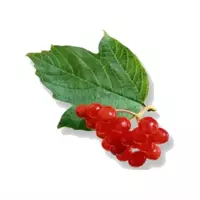Guelder-rose

Viburnum is a stunningly beautiful bush. Viburnum grows in forests, chooses mainly sunny places, edges. One of the most common versions of the origin of the name of the plant is as follows: viburnum berries ripen very quickly, from green they turn red, as if "red" in the sun.
Kalina has been known since ancient times. And invariably she was appreciated by people for her amazing healing properties. The use of viburnum in its fresh form is very problematic, since it has a peculiar taste with pronounced bitterness. However, our ancestors in time immemorial learned to "soar" viburnum, that is, to prepare it in a special way in a Russian oven.
Currently, viburnum is often dried and frozen, added to various desserts and pie fillings. The calorie content of viburnum is about 26 kcal. 100 gr. It is wonderful that when processing the benefits of viburnum do not weaken at all.
The benefits of viburnum
The useful properties of viburnum are contained in its rich and diverse composition. Viburnum contains a huge amount of vitamins, minerals and organic acids. Pectin substances, also generously present in viburnum, contribute to the normalization of digestion, restore the normal functioning of the gastrointestinal tract. Viburin gives bitterness to viburin berries; it also has the ability to narrow vessels.
In folk medicine, the use of not only berries, but also viburnum flowers is widespread. The decoction of them has an extremely beneficial effect on the vocal cords. It is believed that this is a drug of the ability to restore almost completely lost voice. The viburnum bark also has no less benefit. The substances contained in it positively affect the state of the central nervous system, also have antispasmodic effects. Viburnum-based drugs are recommended for insomnia and as a sedative.
The properties of the potassium bark as an effective hemostatic agent are known. It is recommended to be used even for extensive bleeding, especially in the postpartum period. In case of periodontal and inflammation of the oral cavity, rinses with decoction of viburnum bark are prescribed. In addition, viburnum is used to treat gastritis, hypertension, atherosclerosis, various peptic ulcers. Folk medicine recommends using viburnum with honey for colds, coughs, as well as edema of cardiac origin.
Cosmetology also could not bypass the viburnum with its attention. After all, viburnum masks and various agents based on it have an effective tonic, restorative and rejuvenating effect. The benefits of viburnum on the skin of the face are truly remarkable.
Damage to viburnum
Viburnum has a number of contraindications. For example, it is not recommended for pregnant women. The harm of viburnum can affect people who have increased blood clotting and a tendency to thrombus formation.
viburnum 26.3 kCal
Energy value of viburnum (Ratio of proteins, fats, carbohydrates - ju):
Proteins: 0 g (~ 0 kCal)
Fats: 0 g (~ 0 kCal)
Carbohydrates: 7g (~ 28kCal)
Energy ratio (bj | y): 0% | 0% | 106%
 Español
Español Français
Français Português
Português Русский
Русский 简体中文
简体中文 繁體中文
繁體中文 日本語
日本語 한국어
한국어 العربية
العربية Türkçe
Türkçe Қазақ
Қазақ Deutsch
Deutsch Italiano
Italiano Українська
Українська
